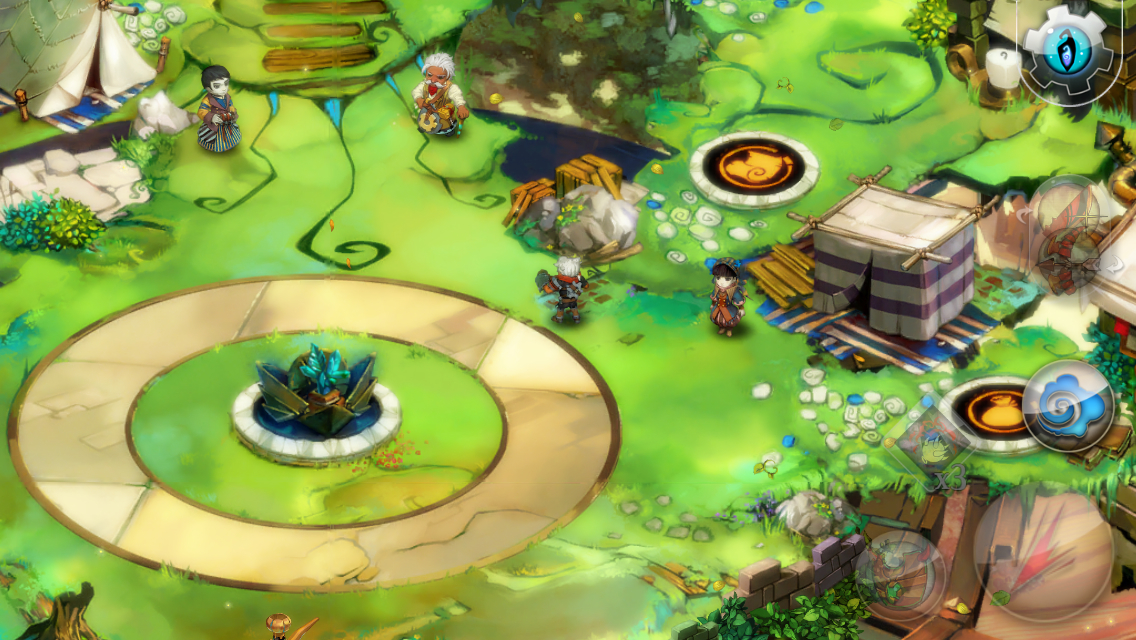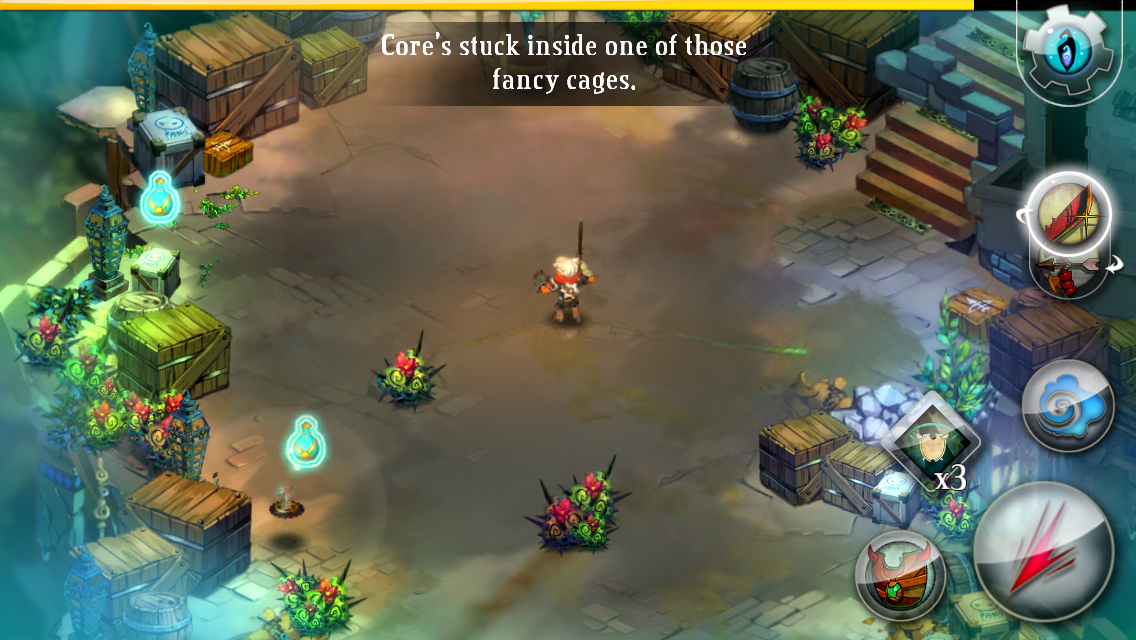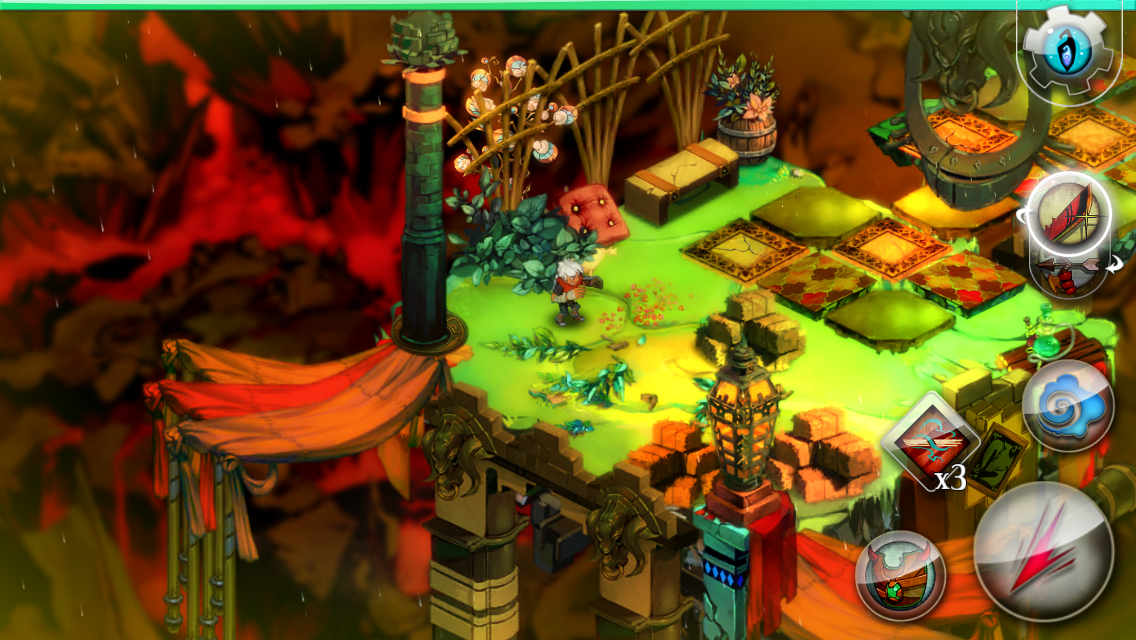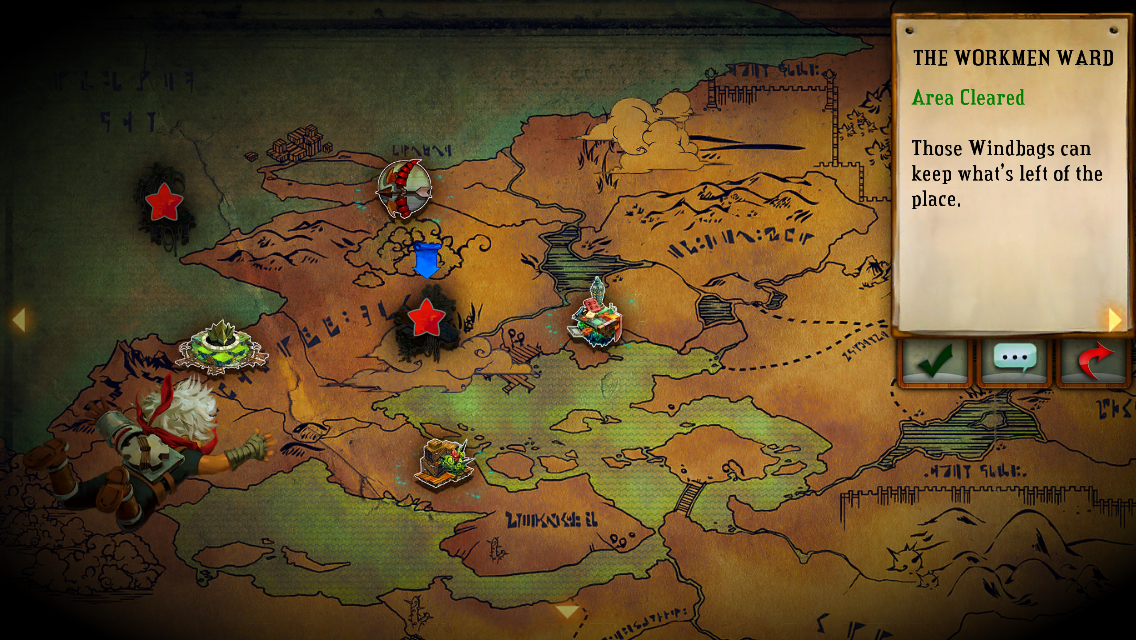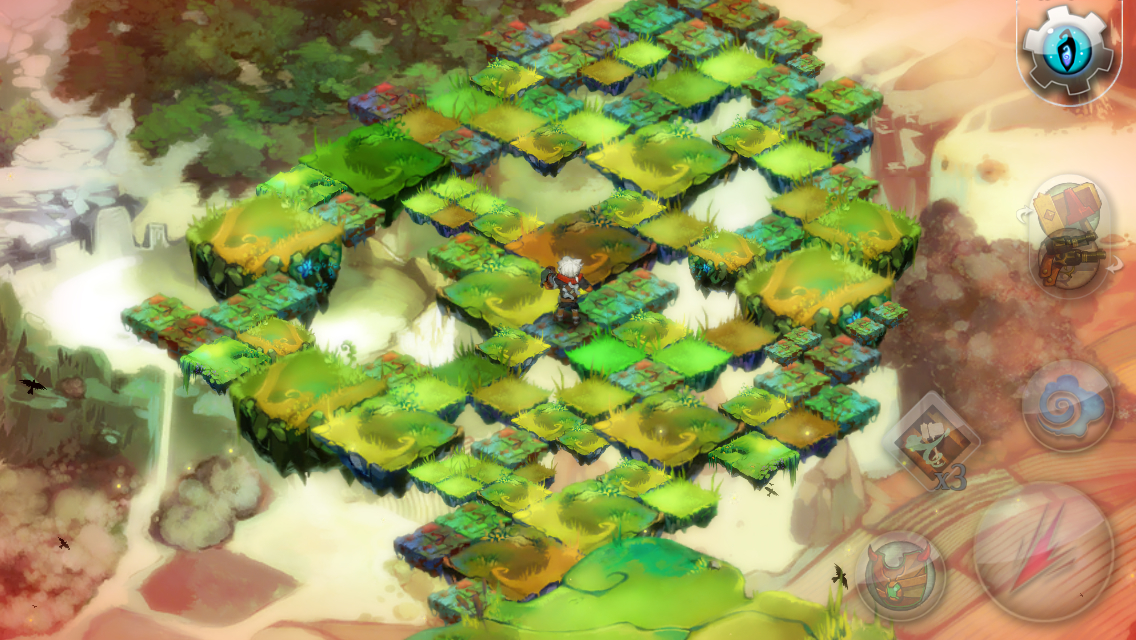 Hello, gentle readers, and welcome to the RPG Reload, the weekly feature where we hear creepy voices narrating our every action in our heads, or maybe that’s just me? Each week, we take a look at an RPG from the App Store’s past to see how it holds up in the light of modern times. I try to cover a wide spread of RPGs in this feature, but just to keep things spicy, I turn the decision over to you, the readers, once per month. All you have to do is comment below, post in the Official RPG Reload Club thread, or tweet me at @RPGReload with the game you’d like to see me play. When the time comes each month, a roll of the dice will determine whose selection wins. Every vote has a chance, so make sure you make yourself heard!
Hello, gentle readers, and welcome to the RPG Reload, the weekly feature where we hear creepy voices narrating our every action in our heads, or maybe that’s just me? Each week, we take a look at an RPG from the App Store’s past to see how it holds up in the light of modern times. I try to cover a wide spread of RPGs in this feature, but just to keep things spicy, I turn the decision over to you, the readers, once per month. All you have to do is comment below, post in the Official RPG Reload Club thread, or tweet me at @RPGReload with the game you’d like to see me play. When the time comes each month, a roll of the dice will determine whose selection wins. Every vote has a chance, so make sure you make yourself heard!
We’ve been covering a lot of older games recently in the Reload, but I thought I’d close out this year’s regular articles with something a bit newer. Bastion ($4.99), from Supergiant Games, is only a few years old at this point, and even less than that when we consider its iOS release. It’s perhaps best known for having a narrator talking about everything you’re doing, as you do it, a feature that could have backfired spectacularly but actually works out pretty well here. To be frank with you, I feel like this one is stretching the RPG definition a little bit, but I needed something a bit shorter for this last column before my vacation, and I think it has just enough RPG mechanics to make it close enough. Your character, The Kid, gains experience points and levels up, and you can upgrade your weapons to make them more powerful, but at the end of the day, Bastion is primarily an action game.
Bastion is the product of two years of development by Supergiant Games, a team composed of industry veterans who decided to strike out on their own. The game debuted on the Xbox 360’s Xbox Live service in July of 2011. It soon made its way to Steam, with an iPad release just over a year later in August 2012. Bastion went Universal in November of that year, and it just recently had PlayStation 4 and PlayStation Vita versions announced for release sometime in 2015. Suffice it to say, the game has been pretty successful.
I don’t want to detract from its gameplay merits, but I think a large reason why the game managed to stand out in many crowded marketplaces is surely down to its style. There’s nothing else out there that looks and sounds quite like Bastion, even if the actual mechanics are well-worn. What’s fascinating to me is that every element that allows Bastion to catch people’s eyes is in there for a design reason. It’s no happy accident that the game is the way it is. The narrator, for example, was conceived as a way to give more information about the world without bringing the action to a halt. He was intended to speak in short, sporadic phrases to avoid getting on the player’s nerves. With those restrictions in mind, giving him a mysterious air and a friendly voice was a perfect fit. He comments on your actions in sometimes meticulous detail, which really isn’t all that different from commentators in sports games, if you think about it. It’s surprising nobody really capitalized on that kind of idea outside of the sports genre until Bastion arrived.
The other striking aspect of Bastion‘s presentation is the way the levels seem to build around you as you move about. The world of Bastion is a broken one, so having everything in pieces that are slowly coming together as you play feels good. It could easily be a simple aesthetic choice, but this too has a purpose. Just as the developers didn’t want the player to have to stop and read exposition all the time, they also didn’t want you to have to constantly open up a menu or clutter the screen to access a map. The pieces that build around you not only look cool, but they also mark where you’ve been. The many destructible elements in the levels serve a similar purpose. Interestingly, according to an interview the developers did with Gamasutra, this came about as a gameplay device first, with the apocalyptic Calamity that serves as the narrative focus of the game simply being a post-hoc explanation for why things work that way. There’s no singularly correct way to make a game, of course, but I always find it fascinating when the gameplay shapes the story, particularly in a story-heavy genre.
As for the gameplay, well, it’s a bit more ordinary in its nuts and bolts, but how they’re put together is at least quite interesting. The majority of the game is spent in isometric action scenes. You’ll use various ranged and melee weapons to take out enemies in search of cores to restore your broken world. In case of an emergency, all survivors were instructed to gather at the Bastion, but when The Kid arrives there, there isn’t much left of it at all. Every time you collect a core, you can take a step towards restoring the Bastion. While you have a choice of what to build, you will eventually construct everything anyway, so it doesn’t matter all that much. Oddly, Bastion is a stage-based game, with a selection screen and everything. As you clear stages, more new ones will open up, until you have all the cores and many of the mysteries have been solved. Game over, happy ending for all, or so you might think.
Naturally, things go terribly awry, a lucky thing since otherwise this game would be even shorter than it already is. You’ll have to make a couple of hard choices that will affect the ending to an extent, the only real narrative choices you’ll make in the course of the game. I think it’s clever how the attentive narrator makes the story feel so personal in spite of that lack of input. You’re not so much carving your own path as you are pulling back big layers of the story, but having comments on things like how a fight ends or which objects you choose to smash means the small details are in your hands. There are plenty of details to seek out, particularly by recovering artifacts, but none of them are necessary. They’re just interesting.
The Kid can carry two weapons with him at a time, and each one feels different enough that you are making an actual significant gameplay decision when you choose which to bring. You can also upgrade each weapon using the currency you find laying around in levels. Each upgrade has you choose between two different perks, so you can customize things a little, according to your gameplay style. The Kid himself will also level up, with each level increasing his health and allowing him to choose one more special tonic to carry. Tonics give passive bonuses, and each one is useful in some way. It’s an interesting setup because in the beginning, your Kid won’t significantly differ from anyone else’s, but as time goes on, the odds of anyone else using the same mixture of tonics and gear that you are become a lot smaller. It’s not the most typical means of character advancement, but it’s engaging enough.
If the game isn’t doing it for you difficulty-wise, you’ll also be able to unlock and activate special handicaps that increase the danger but give you better rewards in return. If you don’t use any of these, Bastion‘s actually a pretty easy game, especially if you have experience with top-down action games. I like this way of handling the difficulty a lot. It’s clearly explained what activating each handicap will mean for you, and it means the game can provide an appropriate challenge for players across a wide range of skill levels. Combined with the extremely straightforward gameplay, it makes Bastion a very accessible game.
To be honest, however, Bastion is a bit too straightforward for my liking. There’s no real evolution in gameplay or monster tactics past the first few stages, so you’ll be using essentially the same skill set to win in the end game that you were near the start. Also, while there’s a bit of choice in exactly which order you take on the stages, you’ll still need to visit all of them anyway. The levels themselves are also very linear, with only occasional side paths to wander down. You don’t even really need to explore since missed items can be purchased from a shop once you’ve built it. That linearity and limited scope makes it a good match for many people’s mobile habits, I suppose, but there’s just a certain something missing here that I can’t put my finger on.
The quality of the port to iOS was pretty high to begin with, but Bastion‘s also received a couple of solid updates since its release. It supports controllers and 4-inch screens, and of course made the hop from being iPad-only to a Universal app. It’s been about a year since its last update at the time of this writing, but the only thing that really seems to need updating is native support for the screens on the new iPhone models. With the MFi support added in, you can now take your pick of gesture-based controls, virtual pad controls, or an actual physical controller, so there’s not much more to do there. It even supports iCloud, which is good because Bastion is a pretty hefty app.
At about six hours for a playthrough, Bastion‘s one of those simple, enjoyable games that you load up once in a while, blast through, and then put away. That’s how I tend to treat it, as a visual and audio palate-cleanser that doesn’t take much of a toll on my attention or time. Firing it up after a long time away and hearing that comforting, friendly voice of the narrator really hits the spot sometimes. I’d love to see the overall concept of the game expanded on in a sequel someday, perhaps with more of an open-world vibe, but that might be getting away from what makes Bastion so successful in the first place.
That’s just how I feel about Bastion, though. I know some people love the game a lot more than I do, and if that describes you, by all means, comment below to tell me what you think of it. If you don’t feel like writing out a big comment, you can always swing by the Official RPG Reload Club thread, or if you like leaving comments but prefer them to be direct and 140 characters long, you can tweet me at @RPGReload. As for me, I’m heading out on a vacation to the magma-filled caverns of Canada for the next two weeks, so I will not be back next week with another RPG from the past. To help you pass the time until I’m back, however, I’ve prepared two special editions of the RPG Reload. They might go up a day early each week due to the holidays, but I can’t say for sure. They’re a bit different from what I normally write in these articles, but I hope you’ll enjoy them anyway. Have a happy holiday season and a sensational New Year celebration, everyone. As always, thanks for reading!
Next Week’s Reload Hint: A triple-pack of holiday cheer!
